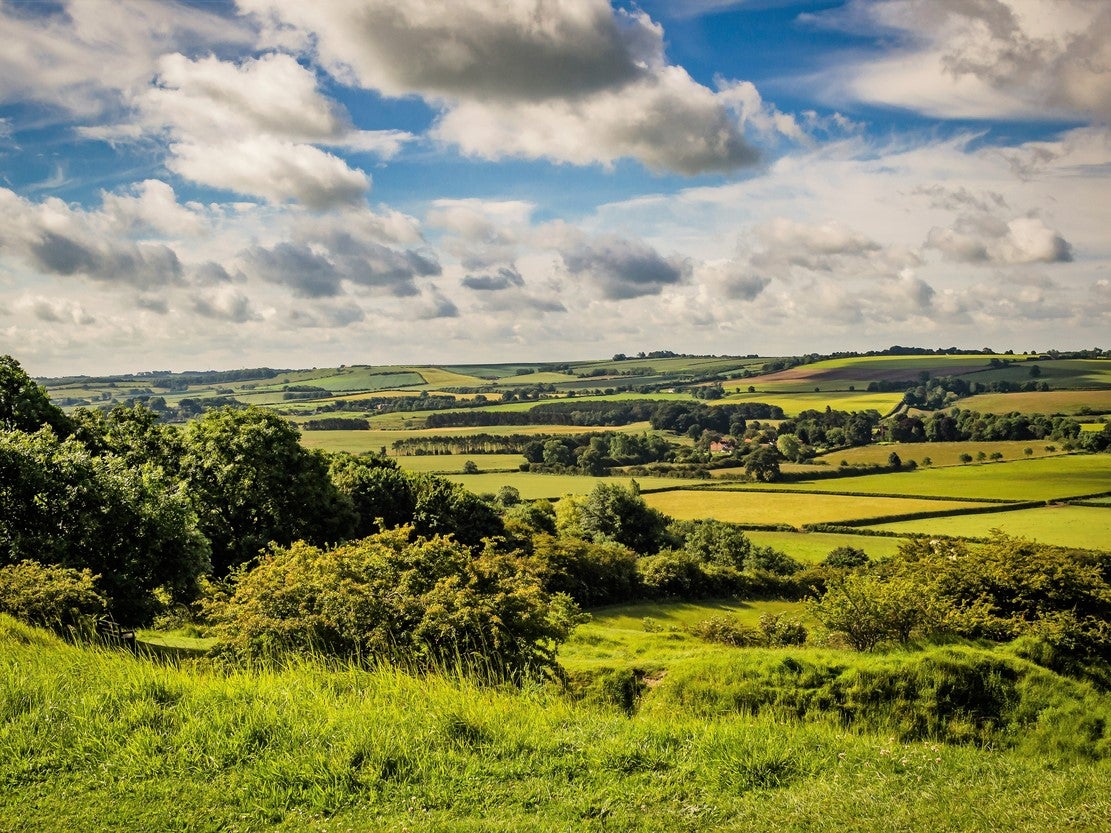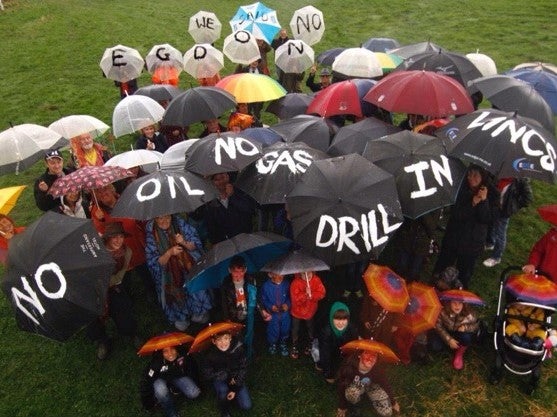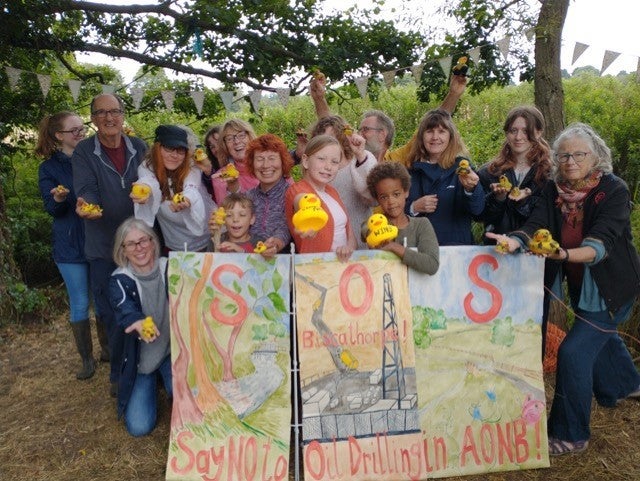How the Wolds was won: Inside the battle to save ‘Lincolnshire’s rainforest’ from oil drilling
Villagers joyous after year-long fight ends with fossil fuel giant being sent packing from conservation area. Now campaigners want entire national planning system overhauled, reports Colin Drury


The decision came late on Monday evening at an unassuming hotel in Lincolnshire.
As world leaders gathered 300 miles away in Glasgow to talk fine words about global warming, it was perhaps here at the rather less glamorous Brackenborough Hotel near the market town of Louth that a real, quantifiable victory was happening in the battle against climate change.
For villagers were celebrating after fighting off an energy company’s bid to drill for oil in the world-famous Wolds.
Quietly and without fanfare, their 18-month David-versus-Goliath struggle came to a climax at the venue when a planning application to extract some 2.4 million barrels of the black fuel from amid the area’s rolling hills and chalk streams was rejected by councillors.
The decision came despite officers previously recommending Hampshire-based Egdon Resources be allowed to drill the area – occasionally referred to as England’s rainforest because of its biodiversity.
That it happened on the same day as the opening of Cop26 was a coincidence. Yet the irony of the situation was not lost on campaigners.
“It was such a juxtaposition,” says Nick Bodian, a retired army officer who was instrumental in the campaign. “You had all these world leaders talking about 1.5 degrees and saving the planet but down here in Lincolnshire, we were having to fight tooth and claw to persuade [the local authority] not to let part of Wolds be turned into a new oil filed.”
In the end, it was probably sheer people power that won the day.
More than 1,700 residents signed a petition against the development close to the medieval hamlet of Biscathorpe and almost 200 more raised individual objections. Figures were drawn up showing that the use of the oil would result in 82,000 tons of carbon being pumped into the atmosphere every year. The local MP Victoria Atkins – a minister in Boris Johnson’s government – threw her weight behind the campaign, with local ward councillors, including Tory Hugo Marfleet, also standing against it.
Unlike in Whitehaven, Cumbria, where developers of a proposed new mine can count on significant local support for the jobs it will bring, many here feared an economic hit. The development, they said, would effectively industrialise an official Area of Outstanding Natural Beauty, inevitably resulting in a reduction of its 3 million annual tourists.
“By any measure – health, economic or environmental – it was a catastrophe in the making,” says 65-year-old Bodian whose group went by the name SOS Biscathorpe. “I wouldn’t say we were confident of winning but you spoke to people round here and, except for the company itself, no one wanted it. No one.”
Now, pertinently, the victorious villagers are weighing up a new challenge with potentially far wider-reaching consequences. They are exploring the idea of a national campaign aimed at having the government’s National Planning Policy Framework rewritten to ban all new fossil fuel projects being developed in the UK.
“These are industries which are completely incompatible with the aim of reaching net zero by 2050, yet all too often we are seeing local communities having to be the ones that make a stand against them,” says Amanda Suddaby, 60, a retired PA and another member of SOS Biscathorpe. “It doesn’t make sense. This is a global issue. It shouldn’t be left to local people in their spare time to protect the planet from these companies. Legislate against this in law and the issue ends.”

Certainly, those in the Wolds are not the only people to have faced – or be facing – such a battle.
Some 40 new fossil fuel projects are currently in the pipeline in the UK, according to a Friends of the Earth report released last month. They range from that now infamous Cumbrian mine – currently the subject of a sprawling planning inquiry – to a proposed vast new oil field in the North Sea west of Shetland. Only last month a vast expansion of a gas and oil site in East Yorkshire was turned down by councillors after fight led by local residents.
“The legislation we have is desperately out of date with the situation the world finds itself in,” says Jamie Peters, director of campaigns with Friends of the Earth. “The planning rules aren’t fit for purpose for getting us to net zero. They’re a nonsense. You have Boris Johnson saying the right things at Cop26 but his government is refusing to budge on this. The only thing that is stopping more of these fossil fuel developments going ahead right now is people power.”
How exactly SOS Biscathorpe itself – a group of about 50 residents spread across the Wolds – will now go about turning itself into an effective government-lobbying machine is yet to be established.
They have, as they point out, spent all their energies up until this moment on saving their own community from drilling. They are also aware Egdon – which has other fields in Keddingotn, also in Lincolnshire and Waddington Cross in Dorset – appears to be eyeing up an appeal. Their managing director has already said such action is “likely”.
But, as the villagers also point out, they have one significant thing on their side: the zeitgeist.
“There are so many groups and communities up and down the country that have either been through or are going through what has just happened in the Wolds,” says Peters. “If we can harness that expertise and that people power – and the moral argument – then we can begin to get this change on the agenda.”
Crucially, perhaps, an increasingly strong scientific consensus now suggests that the opening of new fossil fuel sites does little to improve the UK’s energy security while, in fact, delaying the country’s transition to a carbon free economy.

Certainly, back in the Wolds, the 82,000 tonnes of CO2 that would have been emitted annually by the oil from the proposed site stood in stark contrast to the county’s plans to reduce greenhouse gases by 5,000 tonnes a year.
“These industries are planet killers,” says Suddaby again. “Most people recognise that now. It’s time the government did too.”
Egdon Resources did not respond to The Independent’s request for comment but has previously said the site would have had a “low carbon intensity”.
Join our commenting forum
Join thought-provoking conversations, follow other Independent readers and see their replies
Comments
Bookmark popover
Removed from bookmarks